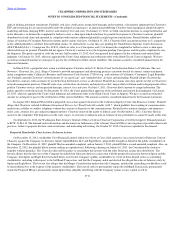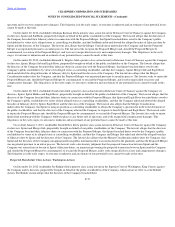Sprint - Nextel 2012 Annual Report Download - page 195
Download and view the complete annual report
Please find page 195 of the 2012 Sprint - Nextel annual report below. You can navigate through the pages in the report by either clicking on the pages listed below, or by using the keyword search tool below to find specific information within the annual report.
Table of Contents
CLEARWIRE CORPORATION AND SUBSIDIARIES
NOTES TO CONSOLIDATED FINANCIAL STATEMENTS
-
(Continued)
Legal proceedings
-
As more fully described below, we are involved in a variety of lawsuits, claims, investigations and proceedings concerning
intellectual property, business practices, commercial and other matters. We determine whether we should accrue an estimated loss for a contingency in
a particular legal proceeding by assessing whether a loss is deemed probable and can be reasonably estimated. We reassess our views on estimated
losses on a quarterly basis to reflect the impact of any developments in the matters in which we are involved. Legal proceedings are inherently
unpredictable, and the matters in which we are involved often present complex legal and factual issues. We vigorously pursue defenses in legal
proceedings and engage in discussions where possible to resolve these matters on terms favorable to us, including pursuing settlements where we
believe it may be the most cost effective result for the Company. It is possible, however, that our business, financial condition and results of
operations in future periods could be materially and adversely affected by increased litigation expense, significant settlement costs and/or unfavorable
damage awards.
Consumer Purported Class Actions and Investigation(s)
In April 2009, a purported class action lawsuit was filed against Clearwire U.S. LLC in Superior Court in King County, Washington by a group of
five plaintiffs (Chad Minnick, et al.). The lawsuit generally alleges that we disseminated false advertising about the quality and reliability of our
services; imposed an unlawful early termination fee, which we refer to as ETF; and invoked allegedly unconscionable provisions of our Terms of
Service to the detriment of subscribers. Among other things, the lawsuit seeks a determination that the alleged claims may be asserted on a class
-
wide
basis; an order declaring certain provisions of our Terms of Service, including the ETF provision, void and unenforceable; an injunction prohibiting us
from collecting ETFs and further false advertising; restitution of any ETFs paid by our subscribers; equitable relief; and an award of unspecified
damages and attorneys' fees. Plaintiffs subsequently amended their complaint adding seven additional plaintiffs. We removed the case to the United
States District Court for the Western District of Washington. On July 23, 2009, we filed a motion to dismiss the amended complaint. The Court stayed
discovery pending its ruling on the motion, and on February 2, 2010, granted our motion to dismiss in its entirety. Plaintiffs appealed to the Ninth
Circuit Court of Appeals. On March 29, 2011 the Court of Appeals entered an Order Certifying Question to the Supreme Court of Washington
requesting guidance on a question of Washington state law. On May 23, 2012, the Washington Supreme Court issued a decision holding that an ETF
is a permissible alternative performance provision. The Court of Appeals has stayed the matter. The parties have agreed to settle the lawsuit. On
December 19, 2012, the Court granted final approval of the settlement and entered final judgment. On January 18, 2013, objectors appealed the Court's
final judgment and settlement order to the Ninth Circuit Court of Appeals. We have accrued an estimated amount we anticipate to pay for the
settlement in Other current liabilities. The amount accrued is considered immaterial to the financial statements.
In September 2009, a purported class action lawsuit was filed against Clearwire in King County Superior Court, brought by representative
plaintiff Rosa Kwan. The complaint alleges we placed unlawful telephone calls using automatic dialing and announcing devices and engaged in
unlawful collection practices. It seeks declaratory, injunctive, and/or equitable relief and actual and statutory damages under federal and state law. On
October 1, 2009, we removed the case to the United States District Court for the Western District of Washington. The parties stipulated to allow a
Second Amended Complaint, which plaintiffs filed on December 23, 2009. We then filed a motion to dismiss the amended complaint. On February 22,
2010, the Court granted our motion to dismiss in part, dismissing certain claims with prejudice and granting plaintiff leave to further amend the
complaint. Plaintiff filed a Third Amended Complaint adding additional state law claims and joining Bureau of Recovery, a purported collection agency,
as a co
-
defendant. On January 27, 2011, the court granted the parties' stipulation allowing plaintiff to file a Fourth Amended Complaint adding two new
class representatives. We then filed motions to compel the newly
-
added customer plaintiffs to arbitrate their individual claims. On January 3, 2012, the
Court denied without prejudice our motions to compel arbitration because of factual issues to be resolved at an evidentiary hearing. The parties
stipulated to allow a Fifth Amended Complaint. The parties agreed to settle the lawsuit. On December 27, 2012, the Court granted preliminary approval
of the settlement. We have accrued an estimated amount we anticipate to pay for the settlement in Other current liabilities. The amount accrued is
considered immaterial to the financial statements. If the Court does not grant final approval of the settlement, this case will remain in the early stages of
litigation and its outcome is unknown.
In November 2010, a purported class action lawsuit was filed against Clearwire by Angelo Dennings in the U.S. District Court for the Western
District of Washington. The complaint generally alleges we slow network speeds when network demand is highest and that such network management
violates our agreements with subscribers and is contrary to the Company's advertising and marketing claims. Plaintiffs also allege that subscribers do
not review the Terms of Service prior to subscribing, and when subscribers cancel service due to network management, we charge an ETF or
restocking fee that they claim is unconscionable under the circumstances. The claims asserted include breach of contract, breach of the covenant of
good faith
F
-
73
























